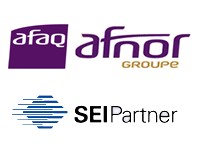
Nowadays the notion of quality shapes all aspects of a business, covering not just products, but people, and processes too. Confidence in the quality capability of an organization is the basic requirement for successful organizations. Quality of processes their results, is and will always be a major competitive factor, if not the most important one.
A quality management system addresses the needs of an organization and delivers tangible business benefits.
Purpose of ISO 9001
Achieve the customer satisfaction with process performance for supplied product and services by defined frame work of responsible processes is the main objective of Quality management systems.
ISO 9001 is the generic and globally recognized standard providing assurance for the quality of goods and services in supplier-customer relations. It is applicable to any manufacturing or service organization irrespective of size & product or services supplied.
Benefits of ISO 9001
Implementing a quality management system will help you enhance customer satisfaction, achieve consistency, and improve internal processes. Certification to ISO 9001 demonstrates to potential customers your organization’s ability to meet their requirements and needs. The main key benefits are:
- Risk based approach
- High level structure
- Accountability of Top Management
- Provide & enhanced customer confidence and satisfaction, which in turn can lead to increased business opportunities
- Ensures your products and services effectively meet customer and applicable statutory and regulatory requirements
- Improved productivity and efficiency of process & people thus reduction in overall cost
- Improved communications, morale and job satisfaction in employees
- Provide frame work to measure your progress towards continual improvement of business performance creating a benchmark
- Reduce dependencies of results on people and rather improve focus on processes
- Helps improve your organizational performance
- Focus on prevention of errors instead correction
- A significant competitive advantage because customer companies require management system certification from suppliers and sub-contractors in order to conduct business with them.
More on ISO 9001
A certificate issued by third party registrar to demonstrates that your business system has been certified against requirements of ISO 9001 requirements. Implementation of ISO 9001 by setting up of internal processes gives confidence to customers about the capability to meet their needs.
ISO 9001 is particularly strong on seeking to reduce defects, both in preventing mistakes recurring and by identifying potential defects before they occur. This reduction in defects brings associated benefits in terms of cost savings.
ISO 9001 is an international standard for quality management, applicable to any organization from all types of business sectors and activities. The internationally recognized ISO 9001 standard is generic in nature created by the International Organization for Standardization (ISO), its objective is to set international requirements for quality management systems. Today world wide over 350,000 numbers of organizations have been certified for this quality standard.
Key features of ISO 9001
QMS ISO 9001 is based on eight quality management principles which are basically fundamentals to good business practices and help organizations focus on goal orientation, systematic management and continual improvement of performance:
- Customer focus (leads to customer satisfaction & exceed expectations)
- Leadership (provide direction to organization)
- Involvement of people (use of full skill/ resources)
- Process approach (management of activities as process for higher output)
- Continual improvement (A permanent objective to achieve next set goal)
- Fact based decision-making (decision based on the correct information)
- Mutually beneficial supplier relationships (your business partner in your growth)
The above eight principles are structured into the following five major section with reduced documentation requirements with high emphasizes on continual improvement and customer satisfaction.
- Quality management system
- Management responsibility
- Resource management
- Product realization
- Measurement, analysis, and improvement
Certification Process for ISO 9001
DQS Certification India appoints a competent & suitable auditor or team of auditors to audit the organization against the standard & scope requested by the clients. Client has to file an application seeking standard for which to be certified. Gap analysis may be performed first to check readiness for the auditee organization which helps organization to improve upon. Routine surveillance audits are carried out to evaluate continual improvement in the validity period. A re certification audit is performed after every three years to maintain continuity of certification.


